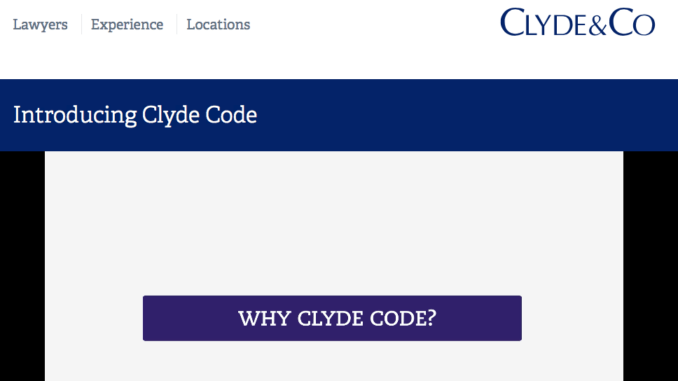
Global insurance law firm, Clyde & Co, has launched a special consultancy division dedicated to helping clients with smart legal contract and blockchain technology, in a further sign of just how far this New Wave legal tech application is becoming part of the wider legal market.
The consultancy is called Clyde Code and is led by Clyde & Co partners Lee Bacon, Nigel Brook, Sally Sfeir-Tait and Christina Terplan. It will provide clients with smart contract legal advice.
One of the key challenges with smart contracts is ensuring that they are legally compliant. As the technology becomes more widely used the reality is that anyone can create a smart contract with new templating systems, such as BlockCAT, which actively encourage consumers to build their own contracts without additional legal input – see story. Whether that contract will then stand up in court is another matter, especially if the contract is complex and/or cross border.
It is also vital that any code used for self-execution works correctly and that any information flows to the on-chain contract, e.g. from IoT devices or global data channels such as financial data streams, and that this information properly connects and interacts with the smart contract in the way intended.
It will also be important to make sure that smart contracts that pay out to a counterparty, for example in an insurance contract or a derivatives agreement, can successfully do this automatically. This will often mean working with other companies and banks, at least if using fiat currencies.
There is also the element of using digital currencies, often a useful tool for making smart contracts function efficiently. New regulatory changes in China, for example, complicate the use of these ‘tokens’. Meanwhile regulators in the US, UK and Hong Kong have also begun to probe how blockchain tokens work and whether they breach local laws on securities. While not all smart contracts involve digital currencies, some may well do so, and this also needs advice.
In short, getting smart contracts technically right and legally compliant will demand some quite hybrid advisory skills. Traditional lawyers may struggle with the coded elements, while coders may struggle in turn with some of the broader legal issues. Clyde Code, it is hoped, will be able to overcome this challenge.

Nuttall has been ranked in the top 100 most influential players in the blockchain space and has advised the London Market Group on related issues. Nuttall provides Clyde Code with access to an international team of software and IT engineers on a preferred supplier basis.
With its combined legal and technical expertise, the law firm said that ‘Clyde Code offers the full range of smart contract services and bridges the gap between the legal and technical aspects of smart contracts implementation’.
The move underlines that smart contracts have breached the barrier as an emerging legal technology. Further evidence was seen earlier this week with Artificial Lawyer’s coverage of how global insurance company AXA had begun to sell smart insurance contracts to consumers (see article here) for airline delays.
Lee Bacon, a partner at Clyde & Co and a key member of the Code team, said: ‘Blockchain provides the rails that smart contracts run on and together they have the potential to radically change and simplify legal contracts and transactions. But legal and technical advice is needed to ensure that workable agreements are reached and enforced.’
‘We are already actively engaged in reviewing smart contract and related distributed ledger transactions across multiple sectors, so setting up a standalone consultancy to bring together our legal expertise in this area is a natural next step,’ he added.
‘However, legal advice cannot operate in a vacuum, especially around technology and concepts that are so fast-moving, which is why a critical element of Clyde Code is our partnership with Gary Nuttall and Team Blockchain, who will bridge the gap between the law and technical aspects of implementation,’ Bacon concluded.
Example of a Clyde Code Case Study:
‘For example, smart contracts allow for insurance monies to be transferred virtually immediately on the occurrence of an event – such as travel insurance paying out following a flight delay. Additionally, smart contracts allow ship owners to monitor their cargo continuously and update insurance contracts in real time as conditions change.
Blockchain provides the rails that smart contracts run on and together they have the potential to radically change and simplify legal contracts and transactions. But legal and technical advice is needed to ensure that workable agreements are reached and enforced.
Clyde & Co lawyers are actively engaged in reviewing smart contract, blockchain and related distributed ledger transactions in a number of sectors, including in respect of a blockchain based fund platform; advising Emirates NBD Bank on the development, implementation, validity and enforceability of a blockchain solution; and working with insurers to establish parametric microinsurance products.
The implementation and impact of smart contracts on the blockchain are increasingly a focus for general counsel and board executives. However, they are different to many other new technologies as they go to the nature of contractual and legal relationships. Thus, they represent not a new sector but another way of transacting in existing sectors.’
If you would like to learn some more about what Clyde & Co is doing in relation to smart contracts please see the short video below.
2 Trackbacks / Pingbacks
Comments are closed.